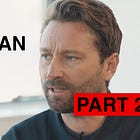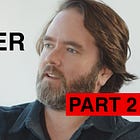Audio episodes of Doomscroll are out on the podcast feed. Find my episode with Will Menaker on Apple, Spotify and everywhere else. New episodes will continue to premiere on YouTube and be released a few weeks later on the audio feed.
Bonus episodes are available for paid subscribers in both video and audio form. If you appreciate this work, would like to contribute to new episodes of Doomscroll or want to catch up on the subscriber only eps, for $6 you can get access to the full archive of video, writing, podcasts and more:
Political Influence
Today, I wanted to explore a subject that has been the focus of intense debates across both legacy and alternative media. Society is only now grappling with the influence of Bro Populism shows, such as the Nelk Boys, Adin Ross and other male podcasters who interviewed Donald Trump leading up to the election. Many Democrats have called for a "liberal Joe Rogan” and other fumbled attempts to influence mass politics.
In this strange moment, I wanted to revisit a piece I wrote for The Guardian (all the way back in 2021), “Are we Ready for Social Media Influencers Shaping Politics?”
These are some of the most important yet under-explored topics of our current media environment. I’ve added some additional commentary below to reflect on more recent developments. For many new readers, this may be your first encounter with this piece. The article is a good introduction for what this newsletter aims to do — not to get distracted by the weekly news cycle but to keep our eyes focused on whats coming over the horizon.
Are we Ready for Social Media Influencers Shaping Politics?
Gen Z is the most online generation in history. They also have increasingly radical political views that aren’t always reflected in traditional media. It’s no surprise that online influencers – who run highly popular social media channels – are dominating political discourse in Gen Z’s online spaces.
Young people’s politics are being shaped by popular YouTubers, livestreamers, podcasters and other influencer personalities, who debate political positions and educate viewers on what political engagement looks like. As audiences grow and watch times increase, the question inevitably arises: will the influencers of the burgeoning alt-media sphere become a new type of political organizer?
I supposed the answer to this question, based on alt-media’s ability to turn out voters, is now a resounding: YES. When this essay was first published, in 2021, I felt like I was already late to the game. Its remarkable that it took another 4 years for any significant conversation around these topics to unfold.
At first glance, this might seem comically absurd. But in the recent pandemic past, most universities, institutions and political organizations transformed into Zoom meetings. Under lockdown, the gap between a college education and a Twitch stream has significantly narrowed. If you don’t speak during an online chapter meeting of the Democratic Socialists of America, can you really be sure you’re not listening to a podcast?
There have been a number of recent events which further blur these distinctions. In January of 2021, Riley Grace Roshong, a Baltimore-based law student and YouTuber, livestreamed her testimony before the Maryland congress in support of House Bill 231, which would eliminate the “panic defense” laws, a legal strategy that allows defendants who attack or murder LGBTQ people to claim that the gender identity or sexual orientation of their victim caused them to enter into a gay or trans “panic”. Roshong researched and drafted her testimony in collaboration with key contributors from her community of followers during a Twitch stream. Roshong’s testimony was one in a chorus of local activists and organizations including FreeState Justice and the ACLU.
Another high-water mark for influencers flexing their political muscle was the Georgia Senate runoff – a key race which would determine the outcome of the 2020 election, in particular whether Democrats would enjoy a majority in both houses of Congress. In December and January, Destiny, a professional gamer turned political commentator on Twitch, led one of the larger door-knocking campaigns of the election. Using his enormous fanbase and platform, the gamer managed to mobilize his followers to knock on an estimated 17,500-20,000 doors in Columbus, Georgia, with approximately 140 volunteers. By comparison, local groups like the Mijente Pac had 200 paid canvassers and the New Georgia Project was seeking 200-300 volunteers.
While I disagree with many of Destiny’s positions, he is inarguably one of the great innovators in this field. I told him as much when we met in person for our episode of the Bridges podcast. (This is a 3 hour episode, so lock in.)
Four years later, there are a several more examples of this content creator-turned-organizer form of political mobilization. Jamal Bowman invited many YouTubers, including Vaush and Jreg, to help canvas for his campaign in June of 2024. None have yet surpassed or met the scale of Destiny’s 2020 efforts in Georgia.
These recent events seem to indicate something larger on the horizon. In each of these instances, influencers took a tiny bit of time out of their usual entertainment programming to make a few political asks before switching back to their regular content (influencers are in the business of making videos, after all). However, as online media encroach further into real-world politics, there is a mounting competitive pressure for content producers to get more politically involved. If you’re going to talk the talk, you’ve got to walk the walk. It’s not enough to sit home and criticize.
It’s worth mentioning that the Proud Boys were founded by the Vice co-founder, comedian and former YouTuber Gavin McInnes in 2016. The broadcasters Cenk Uygur, of The Young Turks, and Kyle Kulinski, of Secular Talk, are among the co-founders of Justice Democrats in 2017. Just a few years before, it was difficult to imagine that online personalities could help to shape offline organizations.
At some point in the future, we will need to do a full ethnography of New York’s 2000’s era youth culture & the influence of Vice magazine. Gavin McInnes is the first and prototypical model of downtown NYC creatives becoming a real political influence. His story forecasts the pole shift in American counter-culture.
Most troublingly, the terrain of social media seems to definitively advantage right-wing politics. While conspiracy and disinformation circulates across the whole of the political spectrum, the far right is uniquely able to manifest offline in the form of gangs or stochastic violence. On the extreme end of this trajectory we find Tim Gionet (AKA Baked Alaska) livestreaming and taking selfies from inside the Capitol riot on January 6. The attention economy incentivizes new and dangerous levels of violent spectacle.
It’s worth theorizing how these forces could be harnessed for something other than conspicuous political stunts. What we know for sure, is that large online audiences, numbered in the hundreds of thousands, do not translate to the ballot box. In 2016, the civil rights activist and Twitter influencer DeRay Mckesson finished a Baltimore mayoral run with only 2.6% of the vote. In 2019, the right-wing YouTubers Carl Benjamin (AKA Sarkon of Akkad) and Mark Meechan (AKA Count Dankula), both ran for MEP, winning just 3.2% in England’s south-west and 1.9% in Scotland, respectively. In 2020, the Gen Z trucker turned TikTok star Joshua Collins earned less than 1% of the vote in Washington’s 10th district. If election outcomes were purely a product of follower counts then political parties would just recruit Kendall Jenner.
The key difference between mainstream celebrities and niche influencers, is the potential for social media to form ultra-specific and hyper-dedicated communities. Viewers feel a strong connection to the content creators they follow and to the communities they participate in. These audiences yield higher than average conversion rates when called upon to take action. Today there are no casual fans – everything is a cult following. In most cases, these political influencer channels are unearthed over the course of months (or years) of exploring. Social media is forming accidental “pipelines” to political education and it’s time to start thinking about what these pipelines lead to.
In hindsight, this is the most important sentiment to underline. While the DNC sought endorsements from major celebrities like Beyonce (and other people that I can’t name because I don’t care about them), the GOP knew to strategically engage with smaller channels that had vastly higher conversation rates. Do not mistake web 2.0’s ad-driven infinite race for scale as a viable political strategy. When it comes to gating actions and decisions, such as voting, reach and attention are a lot less valuable. Viewers only take advice from creators that they trust. Conversion rates are the proof of this theory.
Fandoms are beginning to resemble political affiliations. Crowdfunding approximates membership dues. At their core, organizations are a list of names and addresses. Swap out newsletters for episodic content but the actionable items remain largely the same: voting endorsements and invitations to canvas. On an annual basis, it costs more to support a podcast than to join the DSA.
Clearly, magazines did not replace political parties and social media channels won’t either. But it does create room for something like an Upton Sinclair of the digital age. In an era defined by elite corruption and institutional failure, listener-funded counter-hegemonic narrators are thriving. Young viewers trust alt-media figures like Contrapoints because she doesn’t seem to work for the elites. Critical voices can only be trusted when they aren’t attached to big donors. Bloomberg couldn’t buy a successful meme while Bernie supporters made thousands for free.
I am still holding out for a class conflict, anti-corruption themed celebrity presidential run in the near future. Jon Stewart is not exactly Upton Sinclair but someone like that will do it eventually. Trump has already laid the foundation.
Social atomization and economic precarity are sending increasing numbers of people out on to the web in search of answers. But in the post-political era, most organizations have withered or dissolved. Perhaps members of generation Z are flocking to online fandoms because of the lack of real-world organizations. Further compounding this, is the repellent quality of activist culture which is largely out of touch with the needs of most people. Meanwhile, online communities are fun and cool. Until organization becomes a normal aspect of everyday life, we should expect for online communities to grow at comparatively faster rates.
God damn (lol) this activist line aged nicely. I’m honestly surprised that I was able to squeeze it in there. It’s great that most people have come around to this conclusion, but its sadly too little too late.
So what might these new influencer communities be good for? One indication could be novelty fundraising. In November of 2020, Alexandria Ocasio-Cortez and the Twitch streamer Hasan Piker, along with a team of other players, including the Canadian politician Jagmeet Singh, political streamers the Serfs and video game streamers including xQcOw, DisguisedToast and others, raised a combined $200,000 for eviction defense and food pantries while playing the popular online multiplayer game Among Us. But this particular model seems reminiscent of celebrity fundraisers in the cable TV era and could easily be repeated by the political establishment.
On the nationalist right, political influencers have taken to forming their own parallel events to compete with establishment parties. Inaugurated in 2020, and now in its second year, Afpac, America First Political Action Conference, is an annual event, intended as an off-site alternative to the Conservative Political Action Conference, a Republican stronghold. Throughout 2019, this same group of young American nationalists coordinated to heckle and undermine public events including those which featured Donald Trump Jr and congressman Dan Crenshaw. Small hyper-dedicated groups are ideally suited for specific and targeted interventions.
Influencers are not organizers. But they might be soon. Perhaps they require their own distinct category. Online communities might become a new type of crowdfunded special interest group or thinktank with a built-in spokesperson (like People’s Policy Project, founded by Matt Breunig in 2017). At the least, these overlapping fields are becoming more structurally similar. The key difference seems to be what the community members are asked to do. Soon, content producers might ask for much more.
If fierce online competition is driving these channels to become politically active, this can be harnessed as effective advertising and recruitment into organized political life. It’s worth thinking about these emergent pipelines now, so that in 2028, we find ourselves surrounded by a new rank and file rather than sensationalist livestreaming from the barricades.
There’s a new episode of Doomscroll coming out next week. If you’re all caught up on the public videos, check out these bonus episodes below:








Also - contrapoints endorsed hillary clinton and got deservedly criticised for it.
There won’t ever be a “liberal” joe rogan coz the algorithms don’t boost that type of content. In fact, as a long ago listener and fan of joes, i could see his trajectory into a right wing hack over time. Whether it be audience capture, a thin skin unable to take criticism, or being motivated by greed: chasing algorithm clicks, he went from someone who used to critique empire to promoting agent orange. He never had any guests with genuine counter arguements to jordan peterson or ben shapiro etc etc. The only two trans guests were republicans (where did he even find those !!). He only ever represented “the left” as blue haired liberals switching off jordan petersons speakers. No mention of crack head petetsons 50k speaking fees of course. He really was in on the ground to the culture wars before they became a thing. Allowing alex jones on who could present himself as a lovable rogue rather than the piece of shit money grubbing toe rag that he truly is. And if u look at how the liberal media criticise him they also inadvertently boost the arguement “none of joes critics actually listen to his show”. When he caught covid he got the whole “kitchen sink” from a dr which included a steroid treatment. The liberal media thought it was plausable that a guy earning 200 million dollars a year, with access to the UFC official doctor - would get prescribed horse medicine. They even changed his colour tone on his IG video he posted. Utterly pathetic. Why not ask how much the treatment cost ? Could the average joe rogan user afford the kithcen sink ? Information his viewers could benefit from imo. He went from quoting peter dale scott to quoting ben shapiro. Remember the ben shapiro interview with andrew neil ? Rogan had bens back then. “Oh he knows he made a mistake”. How about the wet ass p-word video ?? Only the mildest pushback from the angry little hobbit joe rogan. Not like the school shooter portable toilets put in a new york school which joe “allegedly” thought were play pens for some liberal who identifies as a cat. Don’t get it wrong. Rogan is an incredibly astute operator who goes to the governer of texas birthday party. He has friends in very high places and benefits enormously. A guy who sits on his ass and gets millions of dollars talking about “tough men lead to good times” or whatever bullshit he’s on. And there’s no one online to take him down a peg or two. Thats the real tragedy imo.